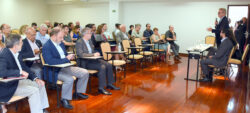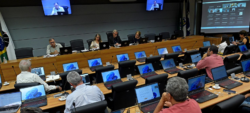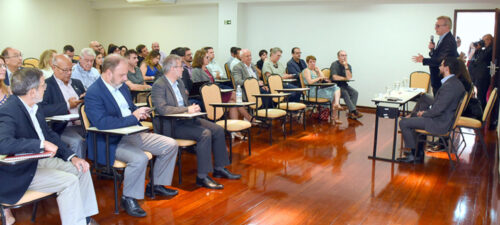The Rectory of Unicamp announced, this Monday (13), the creation of a Working Group (WG) to evaluate proposals for improving the policy of inclusion and indigenous student permanence, based on a suggestion by the Collective of Students. The WG will also study the implementation of a mental health policy, aimed at students from native peoples. The University promoted the first indigenous entrance exam in 2018 and currently has 254 indigenous students enrolled. Another 130 vacancies are expected to be filled for the 2023 school year.
“We are going to install a WG under the coordination of the Dean of Undergraduate Studies, but involving the cabinet, the Executive Board of Human Rights (DEDH) and people associated with indigenous issues, such as members of Caiapi [Advisory Commission for Academic Inclusion and Participation of Indigenous Peoples] and the indigenous collectives themselves”, said the dean, Antonio José de Almeida Meirelles, early this Monday afternoon, after a meeting of more than three hours with members of the Unicamp Indigenous Collective (CIU).
Members of the Collective delivered a letter to the Rectory suggesting the adoption of measures
Members of the Collective delivered a letter to the Rectory suggesting the adoption of measures (Photo: Felipe Bezerra)
“What we want is to better think about the question of the permanence policy and, in particular, the reception in this part of mental health, which is something that worries us a lot nowadays”, justified the dean.
“I think we have to be open to dialogue, meeting demands as far as we are able, but with a lot of willingness to listen to them. We will try to serve them to the limit of what is possible, in addition to developing joint activities”, added Meirelles. “Even to understand the dimension of the problems and manage to minimize them in the future”, he added.
The Dean of Graduation, Professor Ivan Toro, said that the improvement of the existing policy involves teacher training and the creation of new socialization environments for this population, emphasizing the importance of listening to the demands so that the University can build a efficient host system. “We really want the project for indigenous students to succeed at Unicamp. And we are all thinking in this direction, ”he assured.
The creation of a WG to propose improvements in the student inclusion and permanence policy came from the Indigenous Collective.
The group — representing Unicamp students from Campinas, Limeira and Piracicaba — delivered a letter to the Rectory, in which it lists a series of measures that can be adopted in the short, medium and long term.
For immediate adoption, the Collective proposes the creation of the WG for the diagnosis, formulation and implementation of a specific indigenous mental health policy at the University.
The group also asked that the adoption of this policy take into account the original indigenous rights and have a humanized approach, respecting the dignity and specificities of the indigenous citizen.
The Collective also requests the formalization of an agreement with psychology professionals who meet the specific needs of indigenous peoples.
medium and long term
Among the medium and long-term measures, the Coletivo Indígena asks for the hiring of indigenous health professionals; the creation of a center of reference and academic/cultural coexistence for indigenous students on the three campuses, in addition to the hiring and competition of indigenous professors/researchers to work on inclusion policies. They also ask for an adjustment in the value of the permanence grants.
The group asked for the construction of student housing for the campuses of Limeira and Piracicaba, expansion of the Housing of Barão Geraldo and institutional help for the rent of houses for students who cannot find places in the housing.
Luiz Medina, member of the Coletivo: “We left a little more hopeful”
Luiz Medina, member of Coletivo: “We left a little more hopeful” (Photo: Felipe Bezerra)
“The institutional paths are very difficult. The institution ends up creating triggers and ropes and, when it sees it, it ties its own feet and is no longer able to walk”, considered Luiz Medina, indigenous of the Guarani ethnic group and member of the Coletivo, student of the Public Administration course in Limeira.
“That is what is happening with Unicamp. We see many initiatives to deal with the indigenous inclusion policy, but because of the constraints, they end up dying in the bureaucracy”, he criticizes.
“On the one hand, I see that if the white man invents these rules, only he can undo them. Therefore, the justification that there are ties does not work. Just recreate the rules”, argues the native.
“Anyway, we left a little more hopeful with the WG referral. It was as we expected, as a collective, that's why we wrote the letter. That's why we asked for the meeting. I hope this GT is not shelved. And that it is not just a WG for reflection, but, as we said in the commitment letter delivered to the rectory, that it be an Executive WG”, he added.
The dean Antonio Meirelles and the dean of Undergraduate Studies, Ivan Toro: improvement of ongoing actions
The dean Antonio Meirelles and the dean of Undergraduate Studies, Ivan Toro: improvement of ongoing actions (Photo: Felipe Bezerra)
“The meeting was very important. I think the result was very positive, as a first step towards the collective construction of a permanence policy in general and mental health specifically aimed at indigenous people. The points that emerged here will be much discussed between us. Management wants to learn from indigenous students and, together, we are going to seek partnerships with other actors, who can also contribute to this policy of permanence”, said Professor Adriana Nunes Ferreira, Assistant Chief of Staff.
“None of the demands presented here will go unnoticed”, promised Professor Mariana Nery, coordinator of the SAE (Student Attention Service). “All will be evaluated”, she assured.
Collective health professor, Josely Rimoli, recalled actions already developed by the University and revealed the plans for the installation, in Limeira, of an extension center for indigenous studies.
kaiapi
President of Caiapi, professor at the Faculty of Education Alik Wunder says she made a positive assessment of the meeting. “We were able to gather here all the people who are, in some way, involved with the construction of an indigenous permanence policy”, she evaluated.
“The presence of the dean was essential; the dean, the coordination of the SAE (Student Support Service), the Student Psychological and Psychiatric Assistance Service (Sappe). The meeting showed how the University still needs to go further, until it creates a welcoming and permanence structure that overcomes deficiencies”, she said.
The teacher recalled that this population requires special care. She points out that there are major problems to be overcome, such as, for example, the issue of displacement, family ties, cultural adaptation, in addition to the secular violence to which these peoples are subjected.
Adriana Nunes Ferreira, Deputy Chief of Staff: “Management wants to learn from indigenous students”
Adriana Nunes Ferreira, Deputy Chief of Staff: “Management wants to learn from indigenous students”
Mariana Nery, SAE coordinator” “None of the claims will go unnoticed”
Mariana Nery, SAE coordinator” “None of the claims will go unnoticed”
Professor Josely Rimoli: installation of an extension center for indigenous studies in Limeira
Professor Josely Rimoli: installation of an extension center for indigenous studies in Limeira
Alik Wunder, president of Caiapi: “We need institutional protocols for special moments of crisis”
Alik Wunder, president of Caiapi: “We need institutional protocols for special moments of crisis” (Photos: Felipe Bezerra)
For the teacher, the current system has bottlenecks that need to be faced.
“In situations such as death or birth, for example, people do not have their support network, and the institution needs to be more present”, he recommends.
According to her, at those times, those who filled the bottlenecks were professors linked to Caiapi. “And this is a bottleneck that has to do with legislation, because it is a matter of law”, she says.
“The second bottleneck concerns the indigenous person who comes with the family. The permanence structure and scholarships we have today are not enough. The housing is not enough to serve the families and, if you have to rent a house, you cannot do that with 550 reais. Families have come and been unable to stay, and this causes suffering,” he warns.
“We need institutional protocols for special moments of crisis, in addition to professionals to take care of mental health. Professionals with training, who understand the psychological problems of this community, since medicalization does not always solve it”, he says.
In 2021, Unicamp set aside BRL 101 million for the implementation of student inclusion and permanence policies. This year, that value will reach R$ 112 million.





